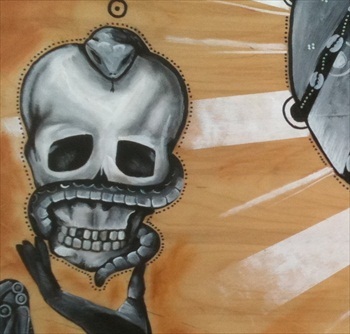
Last time we explored personal traumas and their effects, both positive and negative, on our ability to create. Now let’s take a wider view, this time exploring the reigning attitude of a culture and how it can either thwart or enhance the creative process.
Remember, since the finite ego perceives itself as separate from the world, it almost always feels a sense of lack or deficiency. By contrast, the absolute Self, which is the spark of divinity in each and every one of us, experiences the luminous interdependence that makes everything possible. Though the finite ego and the absolute Self are talked about at the level of the individual, these thing also play themselves out in the larger arenas of culture and society.
In the United States, in our post-modern, multicultural landscape, it is difficult to understand how to behave beyond what the basic laws tell us to do. Unlike more traditional or homogenized societies where there are overarching values shared by all the members, there is no one single cultural context guiding us along, a fact that can be both challenging and rewarding. As one moves about the city, the social norms are constantly changing.
Aside from the indigenous populations who were here for thousands of years, all of us have come from someplace else and have, for whatever reason, left our culture of origin behind. On the positive side of creativity, freed from the constraints of those cultures and rubbing up against the cultures of other transplants, our culture is not a single thing, but one that is rich in diversity. And diversity, not melting pot sameness but a true celebration of the differences between all of us, is a condition that allows creativity and innovation to flourish. Furthermore, the more each and every one of us is able to drop our fears of the differences of other races, religions, and socioeconomic groups, the more we become less judgmental and curious about others, the more our creative capacities will continue to grow in the long run. As an example, what I absolutely love about my home city of Berkeley, California, is not only is there diversity, but integration. And in all areas of life, from food, to the arts, to education, to scientific and technological advances, Berkeley is a city rich in creative innovation.
On a more challenging side, the focus in the United States is on the needs of the individual over the needs of the collective, which can lead to a sort of cultural narcissism. This can be empowering, in that many of us are raised to think we can do almost anything we want, if we just work hard enough. But more than any other country, we are also harder on those who fail to live up to “The Dream”; we are more prone to castigate others than to recognize our collective need to improve the quality of life—to get everyone’s basic needs met—than are other countries. The United States, for example, has roughly 5% of the world population and 25% of the total prisoners in the world.
Here we see the unwillingness to go beyond primary selfish needs at work at the level of culture: instead of helping those who stray from the path, we lock them away, foolishly thinking that by doing so that we will get rid of such “problem” individuals.
Another striking example comes from the Vietnam War. In the United States, where the focus is on the individual, more vets killed themselves after returning home from the fighting than died in the war itself. In Vietnam, however, where the war actually took place and where the emphasis of the culture is more on the collective well-being, the psychological toll of the war was shared more broadly, allowing individuals traumatized by direct fighting to recognize the conflict and their part in it was much bigger than themselves, which allowed for healing.
What’s the lesson for creativity? The traumas that exist within individuals can be either ameliorated or exacerbated by the cultural context in which those individuals operate. In other words, the experience of feeling deficient or lacking on the one hand, or whole and complete on the other, can be affected by the values and ideology of the collective. Like individuals, cultures move up and down the Hierarchy of Needs, depending on the stresses put upon them. When there is a sense of fear or unrest, it is challenging to be creative; whether it be a lack of food or lack of spiritual fulfillment, a group of people who are starving are often hard pressed to be very creative.